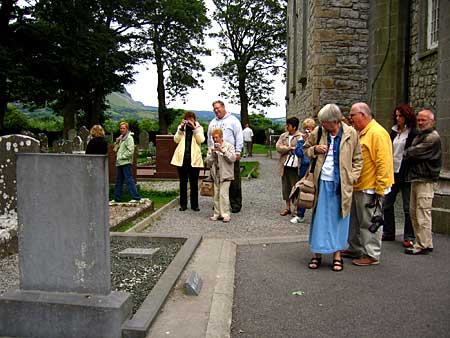 Another variation on the emigration theme.
Another variation on the emigration theme.
Emigration

The view from Owey, an uninhabited island abandoned by its last residents in 1973, off the coast of Donegal. There’s something very poignant about these relics of what was once a thriving community, which once even supported a school.
The Leap

Near Rossport, Co. Mayo.
Quagmire News
From this morning’s New York Times…
The explosion that killed 14 marines in Haditha yesterday was powerful enough to flip the 25-ton amphibious assault vehicle they were riding in, in keeping with an increasingly deadly trend, American military officers say.
In recent months the roadside bombs favored by insurgents in Iraq have grown significantly in size and sophistication, the officers say, adding to their deadliness and defeating efforts to increase troops’ safety by adding armor to vehicles.
The new problems facing the military were displayed more than a week earlier, on July 23, when a huge bomb buried on a road southwest of Baghdad Airport detonated an hour before dark underneath a Humvee carrying four American soldiers.
The explosive device was constructed from a bomb weighing 500 pounds or more that was meant to be dropped from an aircraft, according to military explosives experts, and was probably Russian in origin.
The blast left a crater 6 feet deep and nearly 17 feet wide. All that remained of the armored vehicle afterward was the twisted wreckage of the front end, a photograph taken by American officers at the scene showed. The four soldiers were killed.
Microsoft employee wins bad fiction award
As he stared at her ample bosom, he daydreamed of the dual Stromberg carburetors in his vintage Triumph Spitfire, highly functional yet pleasingly formed, perched prominently on top of the intake manifold, aching for experienced hands, the small knurled caps of the oil dampeners begging to be inspected and adjusted as described in chapter seven of the shop manual.
Thus wrote Dan McKay, a 43-year-old quantitative analyst for Microsoft Great Plains, en route to winning the 23rd Bulwer-Lytton Fiction Contest.
The competition — an international literary parody contest — commemorates the Victorian novelist Edward Bulwer-Lytton (1803-1873). Entrants are challenged to submit bad opening sentences to imaginary novels. Although best known for The Last Days of Pompeii, Bulwer-Lytton opened his novel Paul Clifford (1830) with the immortal words later adopted by Snoopy in the Peanuts comic strip: “It was a dark and stormy night…”
Well, it must make a nice change from writing guff about Windows ‘solutions’.
Mousing around
At last — Apple has given up on the one-button mouse. About time too. Thanks to Dave Hill for the news.
Yeats country

The countryside around Drumcliff is colloquially known as ‘the Yeats country’ (and now signposted as such). It is extraordinarily tranquil and beautiful in a quiet, understated way. These are reflections in Glencar lake, a few miles from Drumcliff.
Gravesnappers

The other day, I went to visit WB Yeats’s grave in Drumcliff churchyard. While I was there a coachload of tourists arrived. They immediately got on with the business of snapping the great man’s alleged last resting place (there is some controversy on the matter) before getting on with the serious business of visiting the souvenir shoppe. That whirring sound you hear is of the great man rotating at 5,500 rpm in his grave — wherever it is.
Apple and the future of podcasting
Today’s Observer column.
IP regimes: an economic analysis
Copyright and patents are methods of remedying a market deficiency — a way of ensuring that innovators get sufficient returns to ensure that society gets a smooth flow of new ideas. We grant temporary monopolies in order to fix the problem. Many of us suspect that current IP regimes are grossly inefficient in these terms, which is why we need economists to take a long hard look at it. For example, the term of copyright protection seems indefensibly lengthy: it introduces long-term monopolies which interfere with free trade. It’s absurd that, say, Windows 95 is protected for 70 — 0r is it 95? — years! Now comes an interesting exploration of the economics by two economists. Their conclusion? Existing copyright and patent protection goes on for far too long! Excerpt:
In the case of copyright, we think that evidence in favor of increasing elasticity of total monopoly revenue is decisive and that existing copyright terms are vastly too long: all of the different sources of data say the same thing. In the case of patents, the evidence is less conclusive and far more subject to measurement problems, but the best available evidence suggests that the elasticity of total monopoly revenue is increasing in this case as well. … And our quantitative analysis indicates that the scale of market effect is strong and that as a consequence there should be both an immediate reduction in patent terms as part of any TRIP agreement augmented by a phased reduction tied to future growth.
Later… Most of the arguments made by those of us who are critical of current IP regimes are based on concerns about freedom and rights (e.g. Larry Lessig’s most recent book is entitled Free Culture). These arguments are, IMHO, valid, but I suspect they are not the ones that will prove most persuasive in the long run. We’d do better to focus on the economics. A rational IP regime would be one that matched protection to market and technological conditions.
Take the music industry as an example. It claims that it needs copyright protection to recoup its investment in artists, promotion, reproduction and distribution, etc. (OK,ok, I know that even that’s questionable, but let’s accept it for the time being.) However, selling music online (e.g. through iTunes) takes away a huge chunk of the cost of distribution, and therefore requires less ‘investment’ by record companies. So in this case, the efficiencies and savings brought about by technological development would logically imply that record companies need less IP protection, not more. So, for music, the period of copyright protection ought to go down.
